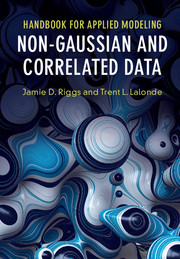Book contents
- Frontmatter
- Dedication
- Contents
- Preface
- 1 The Data Sets
- 2 The Model-Building Process
- 3 Constant Variance Response Models
- 4 Nonconstant Variance Response Models
- 5 Discrete, Categorical Response Models
- 6 Count Response Models
- 7 Time-to-Event Response Models
- 8 Longitudinal Response Models
- 9 Structural Equation Modeling
- 10 Matching Data to Models
- Bibliography
- Index
Preface
Published online by Cambridge University Press: 03 August 2017
- Frontmatter
- Dedication
- Contents
- Preface
- 1 The Data Sets
- 2 The Model-Building Process
- 3 Constant Variance Response Models
- 4 Nonconstant Variance Response Models
- 5 Discrete, Categorical Response Models
- 6 Count Response Models
- 7 Time-to-Event Response Models
- 8 Longitudinal Response Models
- 9 Structural Equation Modeling
- 10 Matching Data to Models
- Bibliography
- Index
Summary
Modern society is data driven. When you buy – or even shop for – a shirt on the Internet, the next time you enter the web, you'll be inundated with advertisements for more shirts, all the outcome of data collection, analysis, and targeted marketing. Global networks have been designed specifically to deliver stock market and commodities market data for near real-time trading. Public services depend heavily on censuses for allocation of government funding and assistance programs to the populations that need them. These same censuses determine the districts needed for so-called enfranchisement, at least in the United States. Travel, particularly international, is regulated based on personal information collected by government agencies. Large chain retailers collect cash-out data to stock according to collective shopping habits. Educators undertake quantitative assessments of new instructional methods to determine best practice. Health policy administrators analyze data to allocate resources according to the timing and volume of patient needs. These applications are just a hint of the universal use of data in both public and private spheres.
The ubiquity of data-driven decisions means that our personal and collective lives are affected daily by how data are analyzed and interpreted. When data are interpreted accurately, we expect fair treatment. When data are improperly collected, analyzed, or interpreted, not only is our quality of life diminished, but the faulty information can debilitate or even kill. Clearly, then, we want data analysts who, conscious of the consequences of poor or incorrect analyses, have the knowledge to extract information from data – properly and with a healthy awareness of any uncertainties that should qualify interpretation.
To support this kind of mastery, we have written this handbook to overcome two common limitations in tutorial resources for practicing data analysts.
• We make a broad selection of the most useful basic models, from a range of disciplines and domains. Applied disciplines that use statistical analysis sometimes rely on a restricted set of tools particular to the discipline. Although this practice has advantages at the entry level, it can encourage overreliance on familiar methods to the exclusion of viable, even superior, alternatives.
- Type
- Chapter
- Information
- Handbook for Applied Modeling: Non-Gaussian and Correlated Data , pp. xiii - xviPublisher: Cambridge University PressPrint publication year: 2017



